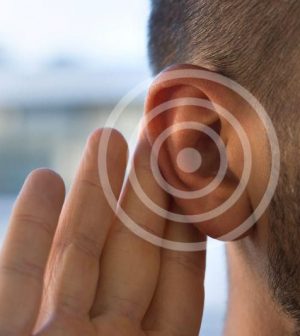- Could Your Grocery Store Meat Be Causing Recurring UTIs?
- Are You Making This Expensive Thermostat Error This Winter?
- Recognizing the Signs of Hypothyroidism
- 10 Strategies to Overcome Insomnia
- Could Artificial Sweeteners Be Aging the Brain Faster?
- Techniques for Soothing Your Nervous System
- Does the Water in Your House Smell Funny? Here’s Why
- Can a Daily Dose of Apple Cider Vinegar Actually Aid Weight Loss?
- 6 Health Beverages That Can Actually Spike Your Blood Sugar
- Treatment Options for Social Anxiety Disorder
Make Efforts to Protect Your Hearing

About 48 million Americans have some degree of hearing loss, but there are ways to preserve this important sense.
Together, the American Speech-Language-Hearing Association (ASHA) and the Hearing Loss Association of America (HLAA) offer some tips for protecting yourself from hearing loss.
“World Hearing Day [March 3] is a great time to remind people that hearing is an important part of overall health and wellness, and needs your attention,” said Barbara Kelley, executive director of HLAA.
“Just like blood pressure, weight, and other health markers, hearing should be checked regularly, treated if necessary, and protected from damage. Whether or not you have a hearing loss, you should wear protection in noisy environments, and limit the volume and time when using earbuds or headphones,” Kelley said in an ASHA news release.
The ASHA and HLAA advise starting by protecting yourself from excessive noise.
Wear hearing protection when in noisy environments, such as entertainment venues, sports arenas or fireworks displays. For young kids, that means well-fitting earmuffs. Older kids and adults can wear earplugs.
Other times when it’s good to wear hearing protection include if you’re routinely exposed to loud noise in your job or if you have a noisy hobby, such as playing an instrument or woodworking.
Take listening breaks, leaving noisy areas at least once per hour to give your ears a rest.
Be mindful about how high you’ve turned up the volume on smartphones and tablets, especially if using earbuds or headphones. Keep the device volume to half or less.
The experts also recommend learning the signs of hearing loss, which can include ringing, buzzing or pain in the ear, or having difficulty following a conversation when more than one person is talking.
It can also include having trouble hearing in noisy places like a restaurant or on the phone. You may frequently think that people are mumbling.
In kids, hearing loss signs can include pulling or tugging at their ears, displaying delays in speech and language development, or seeming unhappy or socially isolated.
Don’t wait years or decades to get help if you are experiencing hearing loss.
“Despite being so common, hearing loss is often misunderstood,” said ASHA president Robert Augustine. “People may feel like they’re getting by with their hearing loss, or that having it is a natural part of aging that isn’t impacting their daily lives. However, often the reality couldn’t be further from the truth. Left unaddressed, hearing loss can have a profound negative effect on a person’s quality of life.”
Ignoring hearing loss can negatively affect academic or career success, social relationships, physical safety and thinking skills with age. This may include earlier onset dementia.
If you notice any signs of hearing loss, seek an evaluation from a certified audiologist.
“We want people to realize there are many ways to address hearing loss that are worth exploring,” Augustine said. “Certified audiologists, highly educated and trained professionals in ear and hearing care, can help them with that.”
More information
Find more on hearing loss from the American Speech-Language-Hearing Association and the Hearing Loss Association of America.
The U.S. Centers for Disease Control and Prevention also has more on hearing loss.
SOURCE: American Speech-Language-Hearing Association, news release, March 1, 2023
Source: HealthDay
Copyright © 2026 HealthDay. All rights reserved.










